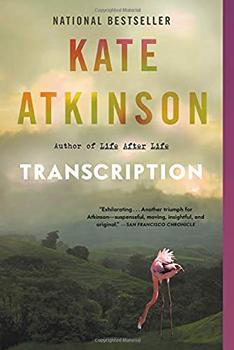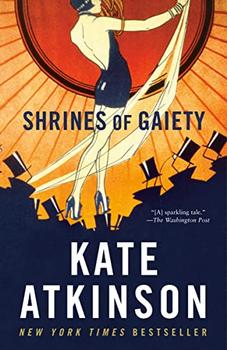Summary | Excerpt | Reviews | Beyond the book | Read-Alikes | Genres & Themes | Author Bio

Over her two-decade-plus career, Kate Atkinson has reinvented herself as a writer several times by working in, and often bending, a variety of genres, from the family drama of her Whitbread Award–winning debut Behind the Scenes at the Museum, through her series of inventive crime novels starring police detective Jackson Brodie, and her literary master works about the Todd family during World War II. Now she's done it again with Transcription, an unconventional historical spy novel in which characters—not to mention readers—are never quite sure whom they can trust.
At the center of Transcription is Juliet Armstrong, who we meet for the first time in 1981, on the eve of the wedding of Charles and Diana. She's just been hit by a car on her way out of a concert hall—an experience that casts her mind back to other music, places, and people she's known. "Suddenly it all seemed like an illusion, a dream that had happened to someone else. What an odd thing existence was," she thinks to herself. And then readers—much like Armstrong's memories—are propelled back in time to a narrative that alternates between postwar London in 1950 and London in 1940, as Britain watches Germany's march across Europe, fearing that they will be conquered next.
In 1940, Juliet is an eighteen-year-old clerk, like many young women during the war; she is plucked from obscurity, however, and assigned to new classified duties, transcribing recorded conversations between a British intelligence officer, Godfrey Toby (undercover as a Gestapo operative), and British Nazi sympathizers ("known as "fifth columnists") making plans to facilitate a German conquest of England. Toby's work is intended to gather intelligence, and also to disrupt any potential plans for a German invasion. Juliet, who finds the transcribing much duller than she had originally imagined or hoped, eventually invents some drama for herself, angling for a romance with her closest colleague, who seems bizarrely disinterested.
Ten years later, the war is over (though the Cold War is well underway), the true atrocities of the Nazi regime have come to light, and Juliet is working at the BBC, producing children's radio programs. She happens to cross paths with Mr. Toby, who pretends not to know her—but soon she begins to encounter coincidences that seem to point back to her former life as a spy, hinting that the secrets she kept then may not have been fully locked in the past.
In previous novels, particularly in the pair of books about the Todd family—Life After Life and A God in Ruins—Atkinson quite deliberately played with narrative conventions in a way that also called into question the nature of reality, the passage of time, and the repercussions of human actions. Transcription might be, on the surface of things, a more conventional novel than those Atkinson has written recently, but it still exhibits some knowing self-awareness (near the end of the novel, Juliet is advised by another character, "We're not approaching the end of a novel, Miss Armstrong"). Like the Todd books, elements of Transcription demonstrate—not only through Juliet's own story but also through those of other characters, that consequences matter and that the past is never truly the past, as much as we might wish that to be the case. "Oh, my dear Juliet," the incredulous and disillusioned protagonist is told near the novel's end, "One is never free. It's never finished."
In her Jackson Brodie novels, Atkinson played with the conventions of detective fiction—here she does so with the spy thriller. Spy novels are all about false and shifting identities, but Atkinson takes it one step further. Juliet herself becomes unmoored by the work she's done and the various personas she and the people around her have adopted: "Juliet Armstrong ... some days seemed like the most fictitious of them all, despite being the 'real' Juliet. But then what constituted real? Wasn't everything, even this life itself, just a game of deception?" Loyalties, betrayals, being duped into playing for the other side—these are all the standard stuff of spy fiction. But in Atkinson's ingenious novel, she uses these conventions as a springboard to consider larger ideas: individual motivations toward patriotism, the ambiguity of reality, and the slippery nature of time.
![]() This review was originally published in The BookBrowse Review in October 2018, and has been updated for the
May 2019 edition.
Click here to go to this issue.
This review was originally published in The BookBrowse Review in October 2018, and has been updated for the
May 2019 edition.
Click here to go to this issue.

If you liked Transcription, try these:

by Robert Seethaler
Published 2025
A vibrant tale of love, companionship, and renewal set against the transformations of 1960s Vienna.

by Kate Atkinson
Published 2023
The #1 national bestselling, award-winning author of Life after Life transports us to a restless London in the wake of the Great War--a city fizzing with money, glamour, and corruption--in this spellbinding tale of seduction and betrayal
Your guide toexceptional books
BookBrowse seeks out and recommends the best in contemporary fiction and nonfiction—books that not only engage and entertain but also deepen our understanding of ourselves and the world around us.